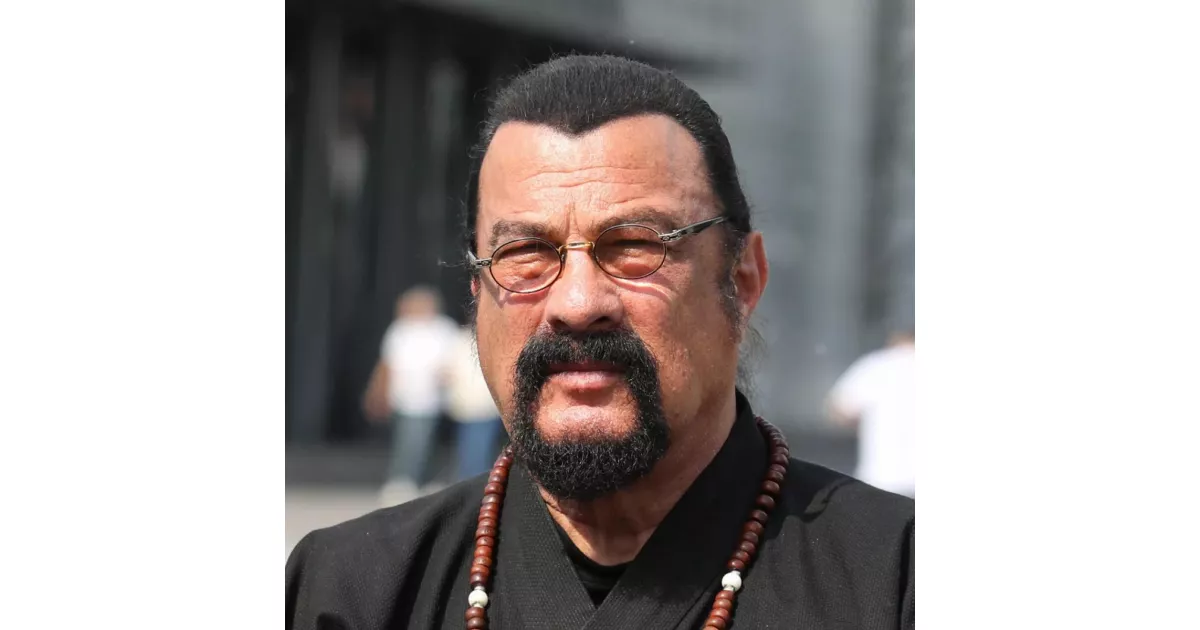Steven Seagal is an American actor, producer, screenwriter, martial artist, and musician. Holding a 7th-dan black belt in aikido, he started his career teaching martial arts in Japan, becoming the first American to teach in an aikido dojo. Later, he moved to Los Angeles and continued teaching. Seagal debuted as an actor in 1988 with Above the Law, notable for being the first American film to showcase aikido in fight scenes. He has starred in over 50 films.
1932: Birth of Harry Lee
Harry Lee, the sheriff who made Steven Seagal a Reserve Deputy Chief, was born in 1932.
April 10, 1952: Steven Seagal's Birth
On April 10, 1952, Steven Frederic Seagal was born. He later became an actor, producer, screenwriter, martial artist, and musician.
1969: Death of Morihei Ueshiba
In 1969, Morihei Ueshiba (the founder of aikido) died. Steven Seagal later claimed he was his student even though it was unlikely due to him only being 17 at the time.
1970: Attendance at Fullerton College
In 1970, Steven Seagal attended Fullerton College, contributing to his educational background.
1971: Attendance at Fullerton College
In 1971, Steven Seagal continued to attend Fullerton College, contributing to his educational background.
December 1974: Marriage to Miyako Fujitani
In December 1974, Steven Seagal married Miyako Fujitani in Japan. She was a second-degree black belt and daughter of an Osaka aikido master.
1978: Earning Aikido Black Belt
In 1978, Steven Seagal earned his aikido black belt while teaching at the school owned by Miyako's family.
1982: Fight Coordinator
In 1982, Steven Seagal had his first experiences in the film industry by working as a fight coordinator on "The Challenge".
1983: Return to the United States and Dojo Opening
In 1983, Steven Seagal returned to the United States with Haruo Matsuoka and opened an aikido dojo, initially in North Hollywood.
1984: Brief Marriage to Adrienne La Russa
In 1984, Steven Seagal was briefly married to actress Adrienne La Russa, but the marriage was annulled the same year.
September 1987: Marriage to Kelly LeBrock
In September 1987, Steven Seagal married actress and model Kelly LeBrock.
1987: Beginning Work on Above the Law
In 1987, Steven Seagal began working on his first film as an actor, "Above the Law", marking the start of his acting career.
1988: Acting Debut in Above the Law
In 1988, Steven Seagal made his acting debut in "Above the Law", considered the first American film to feature aikido in fight sequences, marking a career milestone.
1988: "Golden Era" Start
In 1988, Steven Seagal's 'Golden Era' began, marking the period of his initial successes.
June 1990: Birth of Son Dominic
In June 1990, Steven Seagal and Kelly LeBrock's son, Dominic, was born.
1990: Nasso produces seven of Seagal's films starting with Marked for Death
In 1990, Julius R. Nasso produced seven of Steven Seagal's films starting with Marked for Death.
April 20, 1991: Hosting Saturday Night Live
On April 20, 1991, Steven Seagal hosted Saturday Night Live, an experience later regarded negatively by cast and crew due to his humorlessness and treatment of others.
May 1991: Sexual harassment allegations surface against Seagal
In May 1991, during the filming of "Out for Justice", Warner Brothers employees Raenne Malone, Nicole Selinger, and Christine Keeve accused Steven Seagal of sexual harassment. Malone and another woman received approximately $50,000 each in an out-of-court settlement in exchange for remaining silent.
1991: Commercial Success
By 1991, Steven Seagal had starred in three commercially successful films, establishing his presence in the film industry.
1991: "Golden Era" End
In 1991, Steven Seagal's 'Golden Era' ended, concluding the period of his initial successes.
1991: Sexual Harassment Accusations
Starting in 1991, Steven Seagal faced accusations of sexual harassment or assault from multiple women, marking the beginning of controversies in his career.
September 26, 1992: Nicolas Cage's Monologue on SNL
On September 26, 1992, during Nicolas Cage's monologue on Saturday Night Live, Lorne Michaels referenced Steven Seagal as the "biggest jerk" to have been on the show, highlighting the negative experiences with Seagal's hosting.
1992: LeBell added to Robert Wall's "Dirty Dozen"
In 1992, Gene LeBell was counted as an additional member of Robert Wall's "Dirty Dozen", a group of martial artists willing to answer a public challenge made by Steven Seagal. LeBell however declined to participate.
1992: Starring in Under Siege
In 1992, Seagal starred in "Under Siege", playing Casey Ryback, a Navy SEALs counter-terrorist expert, further solidifying his action star status.
1992: "Silver Era" Start
In 1992, Steven Seagal's 'Silver Era' began, marking the peak of his fame and high-profile blockbusters.
1993: Fujitani's Interview
In 1993, Miyako Fujitani stated in an interview that Seagal was awarded the black belt because the judge fell asleep during Steven's presentation.
1993: Birth of Daughter Arissa
In 1993, Steven Seagal and Kelly LeBrock's daughter, Arissa, was born.
1994: Directorial Debut with On Deadly Ground
In 1994, Seagal made his directorial debut with the film "On Deadly Ground", showcasing his expanded role in filmmaking.
1994: Release of On Deadly Ground
In 1994, Steven Seagal directed and starred in "On Deadly Ground", emphasizing environmental themes, though it was poorly received by critics.
August 1995: Sexual Harassment case against Seagal dismissed
In August 1995, Los Angeles Superior Court Judge Hiroshi Fujisaki dismissed the employment discrimination, sexual harassment, and breach of contract case filed by Cheryl Shuman against Steven Seagal, deeming the claims "repetitive and unintelligible".
1995: Release of Under Siege 2: Dark Territory
In 1995, Steven Seagal released "Under Siege 2: Dark Territory", a sequel to one of his most successful films.
1996: Role in Executive Decision and Filming The Glimmer Man
In 1996, Steven Seagal appeared in "Executive Decision" and filmed "The Glimmer Man", expanding his acting roles.
1996: Executive Decision Role
In 1996, Steven Seagal played a character in 'Executive Decision' who is introduced as a false protagonist, only to be killed halfway through the movie, which is a departure from his typical roles.
February 1997: Recognized as a Tulku
In February 1997, Lama Penor Rinpoche announced that Steven Seagal was a tulku, specifically the reincarnation of Chungdrag Dorje, a 17th-century terton of Tibetan Buddhism.
1997: Cancellation of Deadly Honor
In 1997, 'Deadly Honor', an action video game featuring Steven Seagal for Nintendo 64 and PlayStation, was cancelled in its beta phase for undisclosed reasons.
1997: Parting Ways with Haruo Matsuoka
In 1997, Steven Seagal and Haruo Matsuoka parted ways, ending their partnership in running the aikido dojo.
1997: Release of Fire Down Below
In 1997, Steven Seagal released "Fire Down Below", an environmentally conscious film where he played an EPA agent, though it was commercially unsuccessful.
1997: "Silver Era" End
In 1997, Steven Seagal's 'Silver Era' ended, concluding a period when he reached the peak of his fame and made high-profile blockbusters.
1998: Release of The Patriot
In 1998, Steven Seagal made "The Patriot", another environmental thriller and his first direct-to-video release in the United States.
1998: "Transitional Period" Start
In 1998, Steven Seagal's 'Transitional Period' began, during which he made lower-profile or ensemble films.
1999: PETA Humanitarian Award
In 1999, Steven Seagal was awarded a PETA Humanitarian Award for his activism.
October 2000: Anthony Ciccone visits Seagal during filming of Exit Wounds
In October 2000, Gambino family captain Anthony Ciccone visited Steven Seagal in Toronto during the filming of Exit Wounds.
2000: Seagal/Nasso Productions Partnership Ends
In 2000, the partnership between Steven Seagal and Julius Nasso, Seagal/Nasso Productions, ended after a strained relationship.
January 2001: Seagal meets with Anthony Ciccone in Brooklyn
In January 2001, Primo Cassarino and other gangsters brought Steven Seagal to a meeting with Anthony Ciccone at a Brooklyn restaurant, where Ciccone threatened Seagal to either make four movies with Nasso or pay a penalty.
March 2001: Release of Exit Wounds
In March 2001, Steven Seagal returned to cinema screens with the release of "Exit Wounds", considered a commercial success and a "comeback" for Seagal.
2001: Shift to Direct-to-Video Releases
Beginning in 2001, almost all of Steven Seagal's films were released direct-to-video in North America, marking a shift in his career focus.
2001: Meets Erdenetuya Batsukh
In 2001, Steven Seagal first met Erdenetuya Batsukh (Elle), who worked as his interpreter during his visit to Mongolia.
2001: Seagal seeks help from Genovese crime family
In 2001, Steven Seagal sought help from Genovese crime family captain Angelo Prisco to act as a "peacemaker" and visited him in prison, paying Prisco's lawyer $10,000.
2002: Nomination for Worst Actor
In 2002, Steven Seagal was nominated for Worst Actor at the Stinkers Bad Movie Awards and the Golden Raspberry Awards, due to his performance in "Half Past Dead".
2002: "Transitional Period" End
In 2002, Steven Seagal's 'Transitional Period' ended, concluding a period during which he made lower-profile or ensemble films.
March 17, 2003: Cassarino, Ciccone and others convicted of racketeering
On March 17, 2003, Cassarino, Ciccone and others were convicted of labor racketeering, extortion, and 63 other counts. Steven Seagal testified for the prosecution about the mobsters' extortion attempt.
August 2003: Nasso pleads guilty to extortion conspiracy
In August 2003, Julius Nasso pleaded guilty to the charge of extortion conspiracy.
2003: Open Letter to Thailand
In 2003, Steven Seagal wrote an open letter to the leadership of Thailand, urging them to enact a law to prevent the torture of baby elephants.
2003: Direct-to-Video Period Start
In 2003, Steven Seagal's lengthy 'direct-to-video' period began, becoming his most prolific phase to date.
February 2004: Nasso sentenced to prison, fined, and ordered to take mental health counselling
In February 2004, Julius Nasso was sentenced to a year and a day in prison, fined $75,000 and ordered to take mental health counselling upon release.
2004: Release of Songs from the Crystal Cave
In 2004, Steven Seagal released his first album, 'Songs from the Crystal Cave,' featuring a mix of genres and duets with various artists.
2004: Induction into Martial Arts History Museum Hall of Fame
In 2004, Steven Seagal was inducted into the Martial Arts History Museum Hall of Fame, recognizing his contributions to the martial arts.
2005: Marketing Steven Seagal's Lightning Bolt
In 2005, Seagal Enterprises began marketing an energy drink known as 'Steven Seagal's Lightning Bolt', but it has since been discontinued.
2005: Soundtrack and Single Release
In 2005, Steven Seagal's film 'Into the Sun' featured songs from his album, and the track 'Girl It's Alright' was released as a single with a music video.
April 2006: Release of Mojo Priest
In April 2006, Steven Seagal's second album, 'Mojo Priest,' was released, leading to a concert tour. The album was critically panned.
2007: Death of Sheriff Harry Lee
Harry Lee, the sheriff who made Steven Seagal a Reserve Deputy Chief, died in 2007.
January 2008: Nasso drops lawsuit against Seagal in out-of-court settlement
In January 2008, Julius Nasso agreed to drop a $60 million lawsuit against Steven Seagal for alleged breach of contract after the two settled out of court.
2008: Direct-to-Video Period End
In 2008, Steven Seagal's lengthy 'direct-to-video' period ended, concluding his most prolific phase to date.
2008: Publication of "Seagalogy"
In 2008, Vern published 'Seagalogy,' a work examining Steven Seagal's filmography using auteur theory, noting recurring themes like government corruption and environmentalism.
December 2, 2009: Steven Seagal: Lawman Premieres
On December 2, 2009, 'Steven Seagal: Lawman,' a series following his work in the Jefferson Parish Sheriff's Office, premiered on A&E, drawing a record number of viewers for an A&E original series opener.
2009: Premiere of Steven Seagal: Lawman
In 2009, A&E Network premiered the reality television series "Steven Seagal: Lawman", focusing on Seagal as a deputy in Jefferson Parish, Louisiana.
2009: "Chief Seagal" Period Start
In 2009, Steven Seagal's 'Chief Seagal' period began, during which he moved into television and reflected elements of his 'Steven Seagal: Lawman' persona in his films.
April 12, 2010: Kayden Nguyen files lawsuit against Seagal
On April 12, 2010, Kayden Nguyen filed a lawsuit against Steven Seagal alleging sexual harassment, illegal trafficking of females for sex, failure to prevent sexual harassment, and wrongful termination. She requested over one million dollars in damages.
April 14, 2010: Suspension of Steven Seagal: Lawman
On April 14, 2010, 'Steven Seagal: Lawman' was suspended by the Jefferson Parish Sheriff due to a sexual trafficking lawsuit filed against Seagal.
July 14, 2010: Kayden Nguyen withdraws lawsuit against Seagal
On July 14, 2010, three months after filing her suit, Kayden Nguyen withdrew her claim against Steven Seagal without explanation.
October 6, 2010: Steven Seagal: Lawman Resumes
On October 6, 2010, A&E resumed 'Steven Seagal: Lawman' for its second season after a suspension due to a lawsuit.
2010: Role in Machete
In 2010, Steven Seagal appeared as a villain in Robert Rodriguez's "Machete", a film that received theatrical release.
February 2011: Production of Season 3
In February 2011, production began on Season 3 of 'Steven Seagal: Lawman', relocating from Louisiana to Maricopa County, Arizona.
May 2011: Lyoto Machida's UFC Victory
In May 2011, Brazilian mixed martial artist Lyoto Machida credited Steven Seagal for helping him perfect the front kick used to knock out Randy Couture at UFC 129.
July 20, 2011: True Justice Series UK Premiere
On July 20, 2011, "True Justice" premiered in the UK on 5 USA.
August 30, 2011: Jesus Sanchez Llovera files lawsuit against Seagal
On August 30, 2011, Jesus Sanchez Llovera filed a lawsuit against Steven Seagal. The lawsuit was related to Seagal's involvement in a Maricopa County police raid, seeking $100,000 for damages and an apology for the death of Llovera's puppy during the raid.
January 4, 2012: Season 3 Suspension
Shortly before two episodes were to be aired, Season 3 of Steven Seagal: Lawman was suspended on January 4, 2012, with no explanation given.
2012: LeBell avoids confirming on-set incident with Seagal in interview
In 2012, Gene LeBell was requested to confirm a previous on-set incident with Steven Seagal in an interview. While he avoided a direct answer, he implied the incident was true by stating that Seagal sometimes "cheese off the wrong people".
2012: Updated Edition of "Seagalogy"
In 2012, an updated edition of Vern's 'Seagalogy' was released, adding a fifth era to the analysis of Steven Seagal's career.
2012: "Chief Seagal" Period Mention
In 2012, the 'Chief Seagal' period (2009-present) of Steven Seagal's career was added to an updated edition of "Seagalogy."
January 2013: Llovera's lawsuit against Seagal is dismissed
In January 2013, Jesus Sanchez Llovera's lawsuit against Steven Seagal was dismissed after Llovera failed to file court-ordered paperwork.
2013: Joins ORSIS
In 2013, Steven Seagal joined newly formed Russian firearms manufacturer ORSIS, representing the company and lobbying for the easement of US import restrictions.
January 2, 2014: Season 3 Premieres
Season 3 of Steven Seagal: Lawman premiered on January 2, 2014, after being suspended, but the show was not renewed for a fourth season.
March 2014: Praises Vladimir Putin
In March 2014, Steven Seagal described Vladimir Putin as "one of the great living world leaders" and expressed support for the annexation of Crimea by Russia.
July 2014: Dropped from Blues Festival
In July 2014, following calls for a boycott, Steven Seagal was dropped from the lineup of the August Blues Festival in Haapsalu, Estonia, due to his political views.
August 2014: Appears at Night Wolves Show
In August 2014, Steven Seagal appeared at a Night Wolves-organized show in Sevastopol, Crimea, supporting the Crimean annexation.
2014: Support for Russian Annexation of Crimea
In 2014, Steven Seagal publicly supported the Russian annexation of Crimea, aligning himself politically with Vladimir Putin.
2015: Visits Azerbaijan
In 2015, Steven Seagal visited the Republic of Azerbaijan and met with President Ilham Aliyev, expressing support for Azerbaijan's territorial integrity.
January 11, 2016: Granted Serbian Citizenship
On January 11, 2016, Steven Seagal was granted Serbian citizenship following several visits to the country, and has been asked to teach aikido to the Serbian Special Forces.
November 3, 2016: Granted Russian Citizenship
On November 3, 2016, Steven Seagal was granted Russian citizenship, following a request and lengthy period, and is considered a friend of President Vladimir Putin.
2016: Comments on Protests and Russian Interference
In 2016, Steven Seagal spoke out against protests during the United States national anthem and expressed skepticism of alleged Russian interference in the United States elections, and was challenged to an MMA fight by George Foreman.
2016: Granted Russian and Serbian Citizenship
In 2016, Steven Seagal was granted both Russian and Serbian citizenship, expanding his international ties.
October 2017: Meets with Rodrigo Duterte
In October 2017, Steven Seagal met with Philippine President Rodrigo Duterte while scouting locations in Manila for a possible film.
November 9, 2017: Faviola Dadis accuses Seagal of sexual assault
On November 9, 2017, Dutch model Faviola Dadis posted a statement on her Instagram account, alleging that she had been sexually assaulted by Steven Seagal years earlier.
2017: Co-Authors Conspiracy Thriller
In 2017, Steven Seagal co-authored a self-published conspiracy thriller novel, 'The Way of the Shadow Wolves', with Tom Morrissey.
January 15, 2018: Rachel Grant accuses Seagal of sexual assault
On January 15, 2018, actress Rachel Grant publicly accused Steven Seagal of sexually assaulting her in 2002, during pre-production of his film, Out for a Kill (2003). Grant stated she lost her job on the film after the incident.
February 2018: Los Angeles County District Attorney reviews potential sex-abuse case involving Seagal
In February 2018, the Los Angeles County District Attorney's office acknowledged that it was reviewing a potential sex-abuse case involving Steven Seagal.
March 2018: Regina Simons accuses Seagal of rape
In March 2018, Regina Simons publicly claimed that in 1993, when she was 18, Steven Seagal raped her at his home after she arrived for what she thought was a wrap party for the movie On Deadly Ground.
September 2018: Prosecutors refuse to charge Seagal based on Regina Simons' accusations
In September 2018, Los Angeles prosecutors declined to charge Steven Seagal based on Regina Simons' rape accusations, citing California's statute of limitations.
2018: Appointed Russia's Special Envoy to the U.S.
In 2018, Steven Seagal was appointed as Russia's special envoy to the U.S., further solidifying his relationship with the Russian government.
2019: Theatrical Release of Beyond the Law
In 2019, "Beyond the Law" was released theatrically in North America, making it one of Steven Seagal's few movies to have a theatrical release since Machete.
May 30, 2021: Joins A Just Russia Party
On May 30, 2021, Steven Seagal received an official membership card to the pro-Kremlin party A Just Russia — Patriots — For Truth.
March 2022: Seagal visits Moscow during Russian invasion of Ukraine
In March 2022, Steven Seagal visited Moscow during the Russian invasion of Ukraine. He organized his birthday party, which was attended by individuals connected to Vladimir Putin, including some under international sanctions. This action was criticized amidst the growing international boycott of Russia.
August 2022: Seagal visits Olenivka in Donetsk Oblast
In August 2022, Steven Seagal visited Olenivka in Donetsk Oblast, the site of the Olenivka prison massacre, accompanied by Donetsk People's Republic leader Denis Pushilin. Pushilin claimed that Seagal was filming a documentary about the war in Donbas. Seagal also met with Leonid Slutsky.
2022: Support for Russian Invasion of Ukraine
In 2022, Steven Seagal backed the Russian invasion of Ukraine, continuing his support for Vladimir Putin's political actions.
February 27, 2023: Seagal receives Russian Order of Friendship
On February 27, 2023, Vladimir Putin presented Steven Seagal with the Russian Order of Friendship. The award was given for Seagal's "major contribution to the development of international cultural and humanitarian cooperation".
2023: Awarded Order of Friendship
In 2023, Vladimir Putin bestowed the Russian award of Order of Friendship medal upon Steven Seagal.
Mentioned in this timeline

Instagram is a photo and video-sharing social networking service owned...

Vladimir Vladimirovich Putin is a Russian politician and former intelligence...
PlayStation is a video game brand by Sony Interactive Entertainment...

Nintendo is a Japanese multinational video game company based in...
Ukraine is a country in Eastern Europe the second-largest on...
California is a U S state on the Pacific Coast...
Trending
10 minutes ago Alaska Airlines Expands International Routes from St. Louis and Introduces New Spring Menus.

1 hour ago Mertens vs. Bouzkova: WTA Dubai 2026 Prediction, Odds, and Preview of the Match
1 hour ago Top Reliable Used Cars for Value in 2026: A Comprehensive Guide
2 hours ago Linda Noskova Advances in WTA Dubai: Predictions, Betting Odds, and Tournament Info
2 hours ago Bright Horizons (BFAM) Shares Plunge After Q4 Earnings Report: Market Analysis

2 hours ago Restaurants Prepare for Valentine's Day Amid Rising Costs and Special Dining Experiences.
Popular

Kid Rock born Robert James Ritchie is an American musician...
Randall Adam Fine is an American politician a Republican who...

Pam Bondi is an American attorney lobbyist and politician currently...

Barack Obama the th U S President - was the...

XXXTentacion born Jahseh Dwayne Ricardo Onfroy was a controversial yet...
The Winter Olympic Games a major international multi-sport event held...
